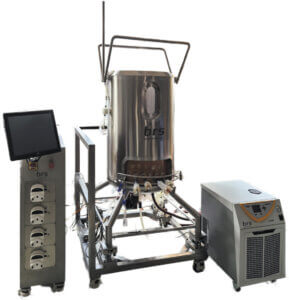The COVID-19 pandemic has affected many areas of life, including the development, market launch and production of life-saving pharmaceuticals. Demand for equipment and consumables for the production of monoclonal antibodies, viral vectors and other biopharmaceuticals has grown exponentially. Many pharmaceutical companies are facing a shortage of supply for single-use biotechnologies (Single-Use, SUS), equipment for the isolation and purification of biomolecules (Downstream bioprocessing equipment).
Manufacturing the COVID-19 vaccines
COVID-19 vaccines development and their large-scale production have become the main reason for the huge demand for biotech equipment, consumables and substances in recent years.
COVID-19 vaccines, which scientists around the world are working on, are being developed and produced on different technological platforms, the main of which are: inactivated vaccines, viral vector vaccines, DNA/RNA vaccines, recombinant protein vaccines. Each platform has both advantages and disadvantages in terms of efficiency and application, as well as its own characteristics of the production process. Depending on the type of cell culture used, as well as the type of antigen molecule, certain hardware for upstream processes and different approaches to the isolation and purification steps can be used.
One of the popular approaches to creating COVID-19 vaccines is the use of adenoviral vectors carrying immunodominant pathogen antigens. The use of such genetic engineering technology allow to avoid usage of live viruses and bacteria in the production of vaccines, and reduces the time for the development and production of new vaccine preparations. Adenovirus vectors naturally enter human cells, causing both humoral and cellular immune responses.
It is known that the HEK 293 cell line is used as a producer of adenoviral vectors. The literature describes methods for culturing HEK 293 cells in roller plants, various bioreactor systems. At the same time, recent data shows that wave and vertical bioreactors with disposable bags (single-use bioreactors) can allow to achieve the best results in terms of yield and process scalability.
These results and the use of bioreactors with disposable bags (rather than steel fermenters sterilized in place) for the production of adenovirus vaccines (particularly against COVID-19) are easily explained. In order to increase the mass transfer characteristics and productivity of cultivation processes in “classic” steel fermenters, special design solutions are used (such as turbine mixers, Rushton mixers), the effects of which are not critical for cells with thick walls. However, in case of animal cells cultivation, especially cultivation of those animal cells which do not have a cell wall(in particular, HEK 2093), usage of this bioreactor design can lead to cell damage during mixing, because not only the type of stirrer, but even the size of the bubbles and the gas flow rate are important in this matter. Single-use systems are more “soft” in this respect.
Also, animal cells usually require a longer cultivation period. And the longer takes the process, the higher is the risks of contamination of the final product. Therefore, comparing the final cost of the product and the risks of crop contamination, manufacturers often prefer to use single-use systems. If the culture is easily susceptible to infection, and the components of the medium are expensive and the cost of the product is also high, then it is better to minimize the risks of “loss” of the product lot due to contamination or ingress of inhibitors (for example, with detergents) which, as is commonly believed, can be achieved only when using disposable systems. If the cost of the product is very high, it may be worth considering the use of disposable materials at all stages of the process – disposable bags for media preparation and make-up, disposable filtration systems and disposable columns for subsequent product purification.
Production of monoclonal antibodies
The development and sale of monoclonal antibodies (mAb) preparations is one of the fastest growing segments of the pharmaceutical market. Already today, without drugs based on mAb, it is unthinkable to diagnose malignant blood diseases, determine the immunological status of patients, and monitor the effectiveness of treatment. Antibodies that recognize tumor-specific antigens can be used to identify tumor cells in a variety of samples, including biopsy samples.
The required degree of purification depends on the field of application of antibodies. For diagnostic purposes, it is sufficient to have antibody preparations of 70–95% purity. On the other hand, when antibodies are used in immunotherapy, their purity should be higher. Purification is carried out in successive stages of affinity and ion-exchange chromatography. Diethylaminoethyl attached to cellulose, Sepharose, or acrylamide beads is most commonly used as an ion exchanger for antibody isolation. In affinity chromatography, antigens attached to a carrier are used for purification. Virus inactivation is carried out in order to disinfect viruses and bacteria in the culture fluid. The next stage of production is aimed at removing the remaining impurities and increasing the volume concentration of the target product. For this, gel filtration on columns with agarose, Sepharose or Sephadex is used.
BRS solutions
With deep expertise and rich experience in implementing complex projects in the field of biotechnology, BRS offers both equipment and consumables under its own brand. To meet the growing needs in SUT, together with our partners, we organized the production of wave bioreactors and disposable bags. Today we are ready to offer the following equipment for cell cultivation (Upstream):
- Rocking bioreactors up to 200 l
- Magnetics stirred bioreactors with single-use bags
- Transport bins and mixers
- Disposable bags for bioreactors and mixers
For Downstream processes we offer:











